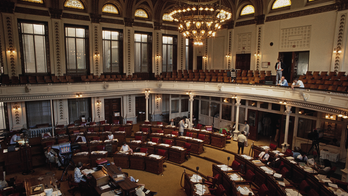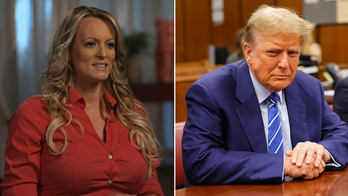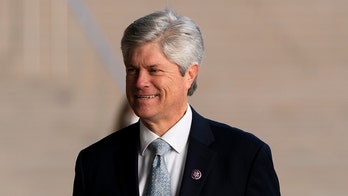In the hunt for campaign money, no distance is too far to travel, especially when the race between President Barack Obama and Republican challenger Mitt Romney is tight and likely to stay that way before the November election.
Both have been aggressively courting Americans living abroad, raising money to pay for what may be the most expensive election in U.S. history and galvanizing a largely untapped group of eligible voters.
The practice is legal and has been used for decades, said former Federal Election Commission Chairman David Mason.
Obama has raised nearly $600,000 from Americans abroad while Romney has brought in about $325,000, according to campaign finance records analyzed by the Center for Responsive Politics. Those figures don't include sums raised overseas by the Democratic and Republican party committees or Romney's take from fundraising in London during his visit there last week.
The sums are just a fraction of the more than $300 million Obama has raised overall and the $155 million raised by Romney, but every penny counts in a race that is so close, as recent polls have shown.
One of Romney's London fundraisers raised eyebrows because the guest list included executives from Barclays, which recently admitted that bank employees were involved in manipulating a key market index. U.S. and British agencies fined the bank nearly half a billion dollars and Bob Diamond, who resigned as CEO, pulled out of the fundraiser. He had already given Romney's campaign the maximum individual donation of $2,500.
A separate group of potential donors awaited Romney in Israel, the second stop on the former Massachusetts governor's three-country tour. But Romney again attracted unwanted attention when his campaign announced it would break with its own precedent by barring reporters from covering a fundraiser at a swanky Jerusalem hotel. A day later, his campaign reversed course and said reporters could cover Romney's remarks to donors.An invitation for the Monday event put the minimum ticket price at $50,000 per couple -- plus a copy of a U.S. passport. Romney advisers said the event was expected to raise more than $1 million.
Romney has vigorously courted Jewish and pro-Israel voters at home and in the Jewish state, hoping to capitalize on the perception by some that Obama hasn't been supportive enough of the critical U.S. ally. A delegation of Romney supporters, including former Bush press secretary Ari Fleischer, recently went to Israel to register eligible U.S. voters.
Matthew Brooks, who heads the Republican Jewish Coalition and organized the trip, noted that those voters live in a dangerous region.
"Whoever is the president of the United States has a direct impact on their lives," he said.
Showing deference to Israel also could help Romney shore up support from Sheldon Adelson, an American casino mogul who has pledged to spend more than $100 million to defeat Obama. Adelson, who attended Romney's speech in Jerusalem on Sunday, is a staunch Israel supporter and finances a widely read newspaper there.
U.S. law bans foreigners from contributing to political campaigns, but American citizens and green card holders can legally donate regardless of where they live, subject to the $2,500-per-person contribution limit that applies to those living stateside. Campaigns, the parties and political committees are expected to review their donors and reject any ineligible contributions.
The candidates at times have raised money from overseas donors while remaining at home.
Early one May morning in Hong Kong, about 50 Americans squeezed into a conference room where Romney was beamed in by video teleconference for a fundraiser, said William Strong, an executive at Morgan Stanley who lives in Asia and helped organize the event.
Obama surrogates have been seen at fundraisers in Shanghai, Paris and London. Next month, actor George Clooney will headline an Obama fundraiser in Geneva, Switzerland. Guests can attend for $1,000. A $5,000 donation includes a photo reception, and a $30,000 contribution buys dinner for two.
Obama has raised at least $2 million through nine expatriates who appear on his most recent list of bundlers -- supporters who group together contributions from friends and colleagues. Five Americans with addresses in the United Kingdom are on the list, plus two from France and one each from China and Switzerland. Romney has not released a full list of his bundlers.
Election law experts have warned that the new proliferation of super political action committees, or independent support groups, has made it impossible to tell whether foreign cash is flowing to the campaigns. The foreign money ban also applies to super PACs, but some of their money comes from vague corporate entities, obscuring the original funding source.
Two percent of the money super PACs raised this year came in the form of so-called "secret money" that can't be reasonably traced, according to a preliminary analysis from an upcoming report by Demos and the U.S. Public Interest Research Group. In addition to super PACs, nonprofit groups are also spending heavily on the 2012 race, campaign finance experts said, and those groups aren't required to disclose their donors as long as their political activities stay within certain limits.
"As long as there is secret money sloshing around in our national elections, the public simply has no way of knowing if illegal foreign money is working its way into influencing our presidential and congressional races," said Fred Wertheimer of Democracy 21, which advocates for campaign finance reform.
An Associated Press review of donations to major super PACs this year found 55 contributions that either listed no address or were missing the U.S. state. The vast majority appeared to be oversights or sloppy bookkeeping, rather than foreign contributions.




